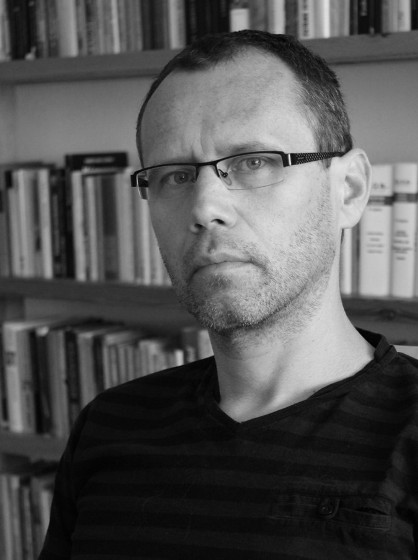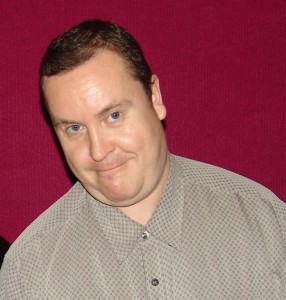Keskeny határ (Hungarian)
Kátó Sándornak
A gyógymód lényege, hogy egy különleges növény teliholdas éjfélkor leszakított leveleit kell porrá zúzni rézmozsárban, majd az így keletkezett port a nyelv alatt elolvasztani, tudniillik ezekben a levelekben csodatévő anyagok halmozódnak föl, melyek a nyelv alól egyenesen azon sejtekbe épülnek be, ahol szükség van rájuk. Ehhez társult a gyógynövényfőzet, aminek sosem tudta meg az összetételét. Szomor Zsolt mégis elfogadta a kúrát, mert csodára vágyott és éhezte a varázslatot. Ennél fogva ki is gyógyult a hetek óta húzódó makacs orrfolyásból, s imígyen megerősödve testben és lélekben, nekivághatott a csepűrágókkal a szórványnak.
A csepűrágók ugyanis a szórványhoz tartottak, hogy egy szívhez szóló színművet mutassanak be ott, ahol hitük szerint kincs a veszendőben lévő anyanyelvi szó és szent a hazafiúi / honleányi érzelem. Tenyerükön hordozták magukkal eme színjátékot, felosztották egymás között, ki-ki egy-egy szerepnyi darabkáját vitte vigyázva, óvatosan, amiképpen édes terhet szokás. És Szomor Zsolt beült a csepűrágók mikrobuszába és együtt nevetett velük. Testvéri érzések szakadtak ki belőle és potyogtak a lába elé, mint hólabdák a faágakról, és lepotyogván szétolvadoztak a busz padlatán, szétpárologtak utasterében, hogy az összetartozás melegével töltsék ki azt serényen…
Elérkezvén egy határhoz, a csepűrágók és Szomor Zsolt átnyújtották útleveleiket a határ őreinek, először a hazaiaknak, akik végignézték, végigtapogatták az okmányokat, aztán a külföldieknek. A külhoni határfelügyelők szinte pillantást sem vetettek az iratokra, csak pecsétet nyomtak beléjük, s már engedték is tovább Szomor Zsoltot és a csepűrágókat egyaránt. Szomor Zsolt évekkel korábbi emlékeinek ellentmondva nem kérdeztek semmit, nem kutakodtak, nem otrombáskodtak, nem kekeckedtek, nem várakoztatták meg az áthaladókat, nem néztek rájuk szúrósan. Ellenben mosolyogtak, jó utat kívántak és integettek. A határ mintha megvékonyodott, elkeskenyedett volna. Beszélték, hogy a következő esztendőben már útlevél sem kell majd az átlépéséhez, és Szomor Zsolt hitte, hogy ez igaz lehet, s kebelében az ország- és nemzetegyesítőket jellemző jellegzetes büszkeség emelgette a fejét.
A csepűrágók a szöveget mondták össze, a dráma pillangó gyanánt libbent szájról szájra. Szomor Zsolt álmatagon hallgatott. Az út szépen, szelíden futott alattuk, nem okozott nehézséget, nem tette próbára sem a sofőr türelmét, ügyességét, sem a rugókat (mint tette volna néhány évvel korábban). A kerekek simán futottak, nem döccentek kátyúkba, nem történt semmi baj, semmi kellemetlenség. Csak az utolsó szakasz bizonyult gorombának, mikor már csaknem elérkeztek úti céljukhoz, az Isten háta mögé egy kicsit balra.
Ők azonban éppen oda vágyakoztak, s vágyuk beteljesedvén a csepűrágók birtokba vették a téli hideg dacára fűtetlen közösségi házat, hogy felállítsák díszleteiket, s közben gyomruk mind apróbbra zsugorodjék a nemes izgalomtól. Mire elérkezett a kitűzött idő, a kettőszáznál alig több lelket számláló, az Isten háta mögött elhelyezkedő falu aprajának és nagyjának jelentős hányada, mintegy száz személy szorongott a teremben, s még ennyien sem tudták otthonossá lehelni. A csepűrágók nekiálltak a szórakoztatásnak, azaz a magukkal hozott, lelkük tüzénél melengetett, szívük vérében fürdetett színdarabba kezdtek. A falu népe, amely az Istennek legfeljebb a hátát, de sohasem az orcáját láthatta, szóval ez a nyomorúságra választott népség figyelt, fülelt, vizslatott. Volt, aki nem értette a színjátékot, mert nem beszélte a nyelvet, amelyet a csepűrágók használtak, tudniillik az Isten háta mögé szorult faluban igen vegyes nemzetiségű lakosság élt. Akadt olyan is, aki azért nem érthette a színházat, mert az évtizedek hosszú során át végzett nehéz munka verejtékével együtt elpárolgott belőle a megértés és a műélvezet képessége is. És olyanról is beszámolhatna az első padsorban kucorgó, ámuldozó Szomor Zsolt, aki nem értette ugyan a színészek ajándékát, mégis megélt minden egyes mondatot, mozdulatot.
Figyelt mindenki, a maga módján odaadóan figyelt. Olykor kimentek, tán a dolgukat végezni, tán egy felest benyelni a sarki kocsmában, egy-egy gyerek fel-felsírt, a kizárólag a többségi nyelvet beszélőknek a kisebbségi (szórvány-) nyelvet is bírók duruzsolva tolmácsoltak; időnként nevettek, ahol nem került nevetnivaló és sírtak, ahol nem volt sírnivaló – mindettől függetlenül az előadás mégis haladt a végkifejlet felé. Gördült a maga útján, akár kavics a domboldalon. És rendben elérkezett a tapshoz, a virágokhoz, a hajlongáshoz. Ahogyan kell, éppen úgy.
Szomor Zsolt elszorult torokkal ült megdermedt fenekén. Ült és figyelt. Szívébe alázat költözött, torkába gombóc. Mögötte egy asszony az anyjával azon a nyelven sutyorgott, amit Szomor Zsolt és a csepűrágók használtak, tehát ezen asszony az anyjával a célközönséghez tartozott: részei valának a szórványnak. De ugyanezen asszony a gyermekéhez már a többség szavaival szólt, ahogyan a férjéhez. Ám a gyermek és a férj is eljött. Becsülettel végigülték a színdarabot, nem értették, de nézték – és Szomor Zsoltnak ettől könny szökött a szemébe. Újra azt érezte, hogy elvékonyult az a határ és két egymástól elvadított nép közel került egymáshoz és az Úristenhez, s talán egyszer, talán hamarosan a Mindenható orcája is diadalmasan fényeskedik majd ezen a tájon. És nem gondolta Szomor Zsolt, hogy ezen gondolata merő pátosz és hamisság. A helyzet az, hogy éppen az ellenkezőjét gondolta. És ettől melegség töltötte el a jéghideg teremben, s látta, hogy a csepűrágók sem fáznak lenge jelmezeikben. És értette már, miért. | Uploaded by | GJ |
| Publisher | Tiszatáj Alapítvány |
| Source of the quotation | Tiszatáj 2007/6. |
| Bookpage (from–to) | 21-22 |
| Publication date | 2007 |
|
Narrow border (English)
To Sándor Kátó
The point of The Cure is to crush the leaves of a special plant torn off at full-moon midnight in a copper mortar, and then to melt the powder made this way under the tongue, because these leaves contain lots of miraculous materials accumulated in them, which materials build into those cells directly from under the tongue, where they are needed. The herbal concoction was added to this, the ingredients of which he never found out. Szomor Zsolt, however, accepted The Cure, because he longed for a miracle and was hungry for magic. Thus he recovered from the nasty running nose, and got strengthened by it both in body and soul, so he could be off with the ham actors towards the sporadic minority.
Because the ham actors were headed towards the sporadic minority in Romania, to present a touching play there, where - according to their belief – each word of the fading mother tongue is a piece of treasure as well as the sacred patriotic feelings. They carried and caressed this drama on their palms, divided it among themselves, each of them carried a piece (one role) very carefully, like a pregnant woman her unborn child. And Zsolt Szomor sat in the minibus and laughed together with them. Feelings of brotherhood had torn out of him and fell on the floor, like snowballs from branches of the trees, and when fallen, they melted on the floor of the minibus, evaporated in the passenger cab, to fill it busily with the warmth of togetherness.…
When arriving to a border, the hams and Zsolt Szomor passed their passports to the guards of the border, first to the domestic ones, who looked through and touched through the documents, then to the foreign ones. The foreign border controllers almost ignored the papers, only stamped them, and then let through Zsolt Szomor and the ham actors as well. In contradiction to Zsolt Szomor’s experiences many years earlier, they did not ask anything, did not do any searching, any fuss, any rude things, did not make the passing people wait, did not take penetrating looks at them. Instead, they smiled, wished a nice journey, and waved goodbye. The border seemed to get thinner, narrower. They said in the following year the passports will not be needed to cross the border, and Zsolt Szomor believed it to be true, and the typical pride of country and nation uniters lifted up his head in his bosom.
The ham actors were rehearsing, the drama flew from lips to lips like a butterfly. Zsolt Szomor was in sleepy silence. The road run smoothly and gently under them, did not cause any trouble, neither did challenge the patience of the driver nor his skills, nor the springs (like it would have done some years ago). Wheels were running smoothly, did not get into puddles, there was no trouble or inconvenience at all. Only the last section of the trip proved to be rude, when they were close to their destination, a little bit to the left from God’s back.
But they were headed right there, and when their wish to get there had come true, the hams took the unheated community house (although it was quite cold outside) into their possession to pitch their set, and in the meantime their stomachs shrank smaller and smaller by the noble excitement. When the scheduled time had arrived, the majority of the population of the small village beyond the back of God, with a little more than two hundred residents, about one hundred people were crowded in the hall, and not even so many people could breathe it to feel like home. The ham actors began to entertain the folks, so they started to perform the play they brought with them, warmed up by the fire of their souls, bathed in the blood of their hearts. The folks of the village, who could only see the back of God, but never its face, so these miserable people were listening, watching. Some of them could not understand the play, because they did not speak the language used by the ham actors, because in this village behind the back of God, a very mixed population lived. There were some, who could not understand theatre because together with the sweat of hard work done for many decades the ability of understanding and enjoying art had evaporated from them. And Zsolt Szomor sitting and ámuling in the first row of benches could report on someone, who could not understand the gift of the actors, but still, lived each sentence, move.
Everyone was listening, in her/his own way carefully listening. Sometimes they went out, maybe to go to the toilet, maybe to drink up a short drink in the pub on the corner, one or another child began to cry, for those who only speak the language of the majority, those who speak the language of the sporadic minority, silently interpreted. From time to time they laughed, when there was nothing to laugh at, and cried when there was nothing to cry about. Despite this, the play went on towards its climax. Rolled on its way, like a rock on the slope of the hill. And it arrived all right to the clapping of hands, flowers and bows. The way it should be.
Zsolt Szomor was sitting on his frozen buttocks with dry throat. He was sitting and listening. There was submission in his heart and lump in his throat. Behind him a woman was whispering to her mother in the language Zsolt Szomor and the hams used, so this woman with her mother belonged to the target audience: they were part of the sporadic minority. But the same woman talked to her child with the words of the majority, as well as to her husband. However, the child and the husband also came. They sat thru the play with honor, did not understand it, but watched it – and because of this, tears fell from Zsolt Szomor’s eyes. He felt it again, that the border got narrower, and those two nations turned against each other got closer to each other and God, and maybe once, maybe soon the face of the Almighty will victoriously shine on this area. And Zsolt Szomor did not think this thought of his is merely pathos and falseness. Situation is: he thought just the opposite. And warmth filled him because of this in the ice cold room, and he saw that the hams were not cold either in their flimsy costumes. And he already knew why.
| Uploaded by | GJ |
| Publisher | Villa Inferior |
| Source of the quotation | Együtt két kultúra - együtt több kultúra / Two cultures together - more cultures together |
| Bookpage (from–to) | 98-99 |
| Publication date | 2010 |
|





